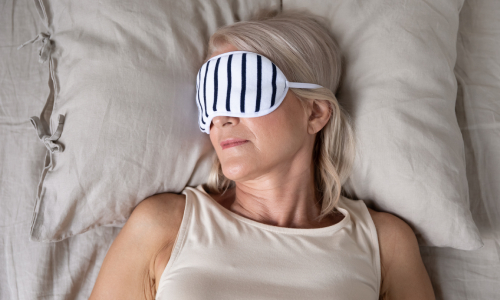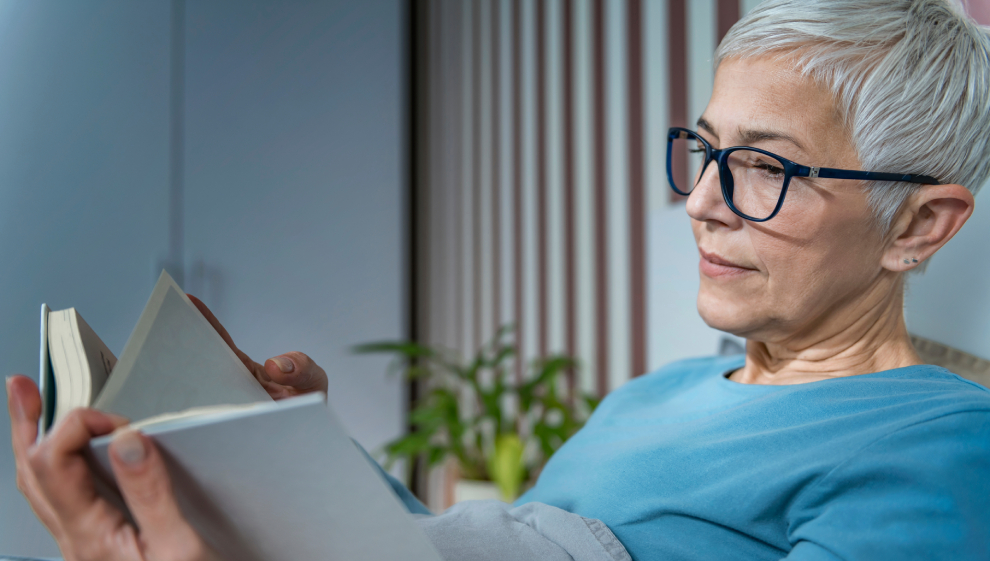Sleep tips when you’re in menopause
- Overview

The Sleep Foundation found that 46% of individuals have sleep difficulties in the years leading up to menopause, but following menopause half of people experience sleep disorders. Symptoms of menopause can begin 4-7 years before a persons a last period and can continue for years post menopause, so understanding what we can do to support our sleep health is very important for our short and long term wellbeing.
Common sleep problems during menopause
The most common issues with sleep during menopause include:
- hot flashes
- insomnia
- obstructive sleep apnoea (OSA)
- restless leg syndrome
- concerns associated with anxiety and depression, which can heighten sleep problems.
Why does menopause affect sleep?
The hormones that link menopause and sleep are oestrogen and progesterone, both of which decline during the menopause. This subsequently affects the body’s internal clock, also known as the circadian rhythm or sleep-wake cycle, due to the impact on serotonin.
Oestrogen is not only involved in reproduction but also brain function. When individuals enter peri-menopause (and later the menopause) we can see a significant impact on the brain.
This is one of the factors behind things like hot flashes, as when oestrogen doesn’t activate the part of the brain responsible for thermoregulation properly (the hypothalamus), the brain cannot regulate body temperature correctly. This can cause hot flashes and things like night sweats that influence and impact the quality of our sleep.
How to sleep better during menopause
It’s important to discuss your symptoms and concerns with a medical practitioner, but there are lots of lifestyle-related actions you can take to support improved sleep quality. The majority of these are focused on physical activity and sleep hygiene. Here are 11 tips to help you sleep soundly:
1. Follow a regular sleep schedule
Go to sleep and get up at the same time each day, even at the weekend.
2. Avoid napping
Particularly in the late afternoon or evening, as it may keep you awake at night.
3. Develop a bedtime routine

Some people read a book, listen to soothing music, or soak in a warm bath. It's recommended to ‘budget’ at least 30 minutes for winding down.
4. Avoid screen time before bed
The light from TVs, computers and mobiles can interfere with your sleep-cycle and the release of melatonin (the sleep hormone), therefore make it difficult for you to fall asleep.
5. Keep your bedroom at a comfortable temperature
Not too hot or too cold, and as quiet as possible.
6. Exercise at regular times each day – but not close to bedtime
One study showed that with a physical activity intervention (i.e. achieving at least 150 minutes of moderate activity each week), menopausal symptoms rated severe or very severe reduced significantly:
- Hot flushes reduced from 30.1% to 11.8%
- Sleep problems declined from 28% to 6.5%
- Joint discomfort reduced from 52.7% to 4.4%.
Read more about how exercise can help you sleep.
7. Avoid eating large meals close to bedtime
Your digestion slows down close to bedtime, meaning the body now has to work harder when it wants to be moving to a restful state.
8. Stay away from caffeine late in the day
Caffeine (found in many coffees, teas, and chocolate) can have a half-life of 5 hours, meaning after your last caffeinated food or drink you'll still have half the amount of caffeine in your system five hours later!
Caffeine is not only a stimulant but can also block adenosine receptors in the brain, a key sleep-promoting chemical.
9. Avoid alcohol before bed
Alcohol won't help you sleep, despite its sedative effects. Even small amounts of alcohol disrupt your quality and quantity of sleep and can induce feelings of fatigue the following day.
10. Use relaxation techniques
Relaxation is essential to a balanced autonomic nervous system and helps to stimulate the parasympathetic nervous system (PNS) axis, supporting repair and recovery.
Likened to the body’s ‘brakes’, this system helps to slow us down, prepare us for the next challenge and maintain our homeostasis (physiological balance) and circadian rhythms.
11. Diet considerations
Consider including foods rich in tryptophan (foods such as turkey, nuts, seeds, wholegrains, legumes) and magnesium (foods such as leafy green vegetables, avocado, whole grains, dark chocolate) in your diet to help support sleep quality.
Tryptophan can help increase serotonin production, a chemical messenger that supports mood, sleep, digestion etc., which in turn increases melatonin. This hormone helps to control how and when you sleep.
Meet our sleep experts
This video is part of our on-demand 24/7 content. To view more videos and subscribe to our 24/7 virtual gym click here.
Last updated Tuesday 25 June 2024
First published on Thursday 9 February 2023

